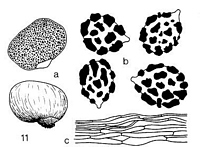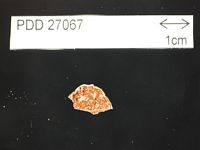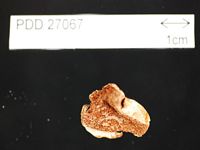|
 Cortinarius flavidulus Cortinarius flavidulus
SynonymsThaxterogaster luteolus
BiostatusPresent in region - Indigenous. Endemic
Images (click to enlarge)
Caption: Thaxterogaster
luteolum Hk. sp.n. (type): a. fruitingbodies. b.
spores. c. cuticle. | 
Caption: Dried type specimen
Owner: Herb PDD | 
Caption: Dried type specimen
Owner: Herb PDD |
Article: Horak, E. (1973). Fungi Agaricini Novazelandiae I-V. Beihefte zur Nova Hedwigia 43: 200 p.
Description: Gastrocarp
20-35 x 15-20 mm, subglobose, depressed globose or irregularly tuberiform, peridium
1 mm thick, frequently peeling off and exposing parts of the gleba, whitish-yellowish
becoming brownish at maturity, dry, smooth, without veil remnants. Gleba loculate,
cells up to 2 mm diam., not radially arranged, neither exposed nor dehiscent
from the base of the stipe, coffee brown to rust brown. Stipe absent or button-like,
resembling a subgleba in the Lycoperdaceae concolorous with the peridium.
Context whitish. Odor and taste not distinctive. Chemical reactions on peridium:
unknown.
Spores
12-15 x 9-11 µm, broadly ovate or subglobose, very coarsely warted, with prominent
apiculus, ferruginous. Basidia 30-35 x 10-12 µm, 4-spored. Cystidia absent.
Epicutis consisting of cylindrical, repent, hyaline, not gelatinised, thin-walled
hyphae forming a cutis, without conspicuous pigment; subcutis cellular. Clamp
connections not observed.
Habitat: On
ground amongst litter under Nothofagus cliffortioides and N. solandri.
New Zealand.
Notes: This
species is characterised by the pale yellow colour of the peridium, absence
of stipe-columella and the coarsely warted spores. It is closely related to
Th. nivale Hk. but differs in the dry cuticle and smaller sized spores.
|